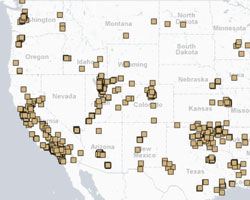MPC Research Reports
Report Details
Abstract
 The growing uncertainty about oil prices and availability has made long-range transportation planning more challenging. Rather than relying on trend extrapolation, this study uses market mechanisms to evaluate key long-range transportation planning assumptions. Although the Washington Department of Transportation (WSDOT) is pursuing alternative fuels and energy sources, this study focuses primarily on natural gas. In particular, this study will help WSDOT assess the likelihood natural gas will substitute for petroleum fuels and estimate the impact changes in fuel prices will have on travel demand, fuel consumption, emissions, and tax revenues.
The growing uncertainty about oil prices and availability has made long-range transportation planning more challenging. Rather than relying on trend extrapolation, this study uses market mechanisms to evaluate key long-range transportation planning assumptions. Although the Washington Department of Transportation (WSDOT) is pursuing alternative fuels and energy sources, this study focuses primarily on natural gas. In particular, this study will help WSDOT assess the likelihood natural gas will substitute for petroleum fuels and estimate the impact changes in fuel prices will have on travel demand, fuel consumption, emissions, and tax revenues.
The results of the modeling show that the impacts of natural gas vehicles (NGV) have the potential to affect vehicle miles traveled (VMT), emissions, and fuel tax revenue. The effects of NGVs are muted by the limited use of them in the fleet. Challenges with widespread integration include the increased upfront capital costs associated with NGVs, decreased power for heavy vehicles, and range anxiety in locations without developed natural gas fueling infrastructure. The NGV market in the state of Washington is hampered by these factors. The modeling and analysis in this report can be used to analyze changing conditions in the market and the effects on key transportation metrics.
How to Cite
Heaslip, Kevin, Ryan Bosworth, Ryan Barnes, Ali Soltani Sobh, and Michael Thomas. Do Changing Prices Portend a Shift in Fuel Consumption, Diminished Greenhouse Gas Emissions, and Lower Fuel Tax Revenue?, MPC-15-278. North Dakota State University - Upper Great Plains Transportation Institute, Fargo: Mountain-Plains Consortium, 2015.

